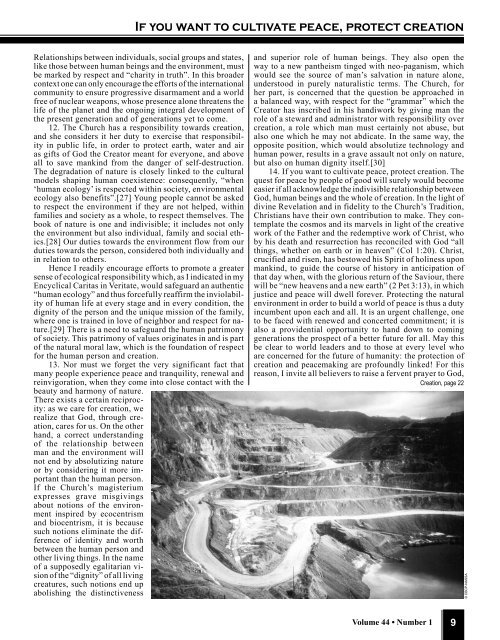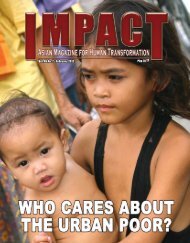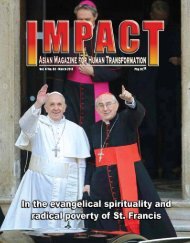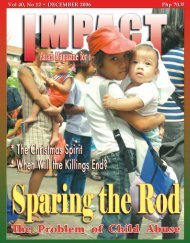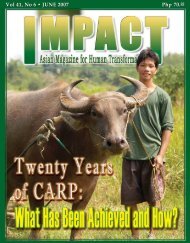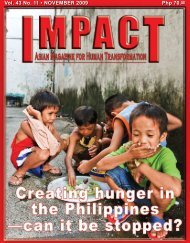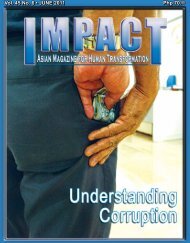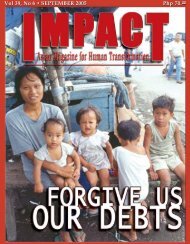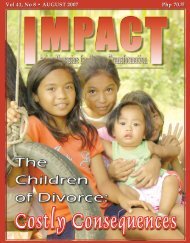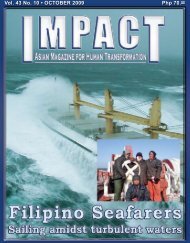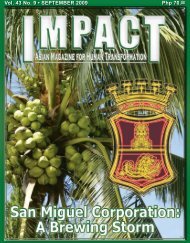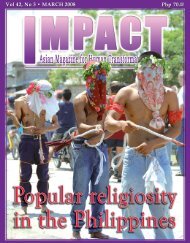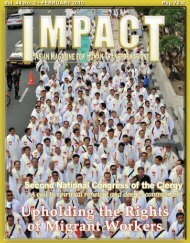Php 70.00 Vol. 44 No. 1 • JANUARY 2010 - IMPACT Magazine Online!
Php 70.00 Vol. 44 No. 1 • JANUARY 2010 - IMPACT Magazine Online!
Php 70.00 Vol. 44 No. 1 • JANUARY 2010 - IMPACT Magazine Online!
Create successful ePaper yourself
Turn your PDF publications into a flip-book with our unique Google optimized e-Paper software.
If you want to cultivate peace, protect creation<br />
Relationships between individuals, social groups and states,<br />
like those between human beings and the environment, must<br />
be marked by respect and “charity in truth”. In this broader<br />
context one can only encourage the efforts of the international<br />
community to ensure progressive disarmament and a world<br />
free of nuclear weapons, whose presence alone threatens the<br />
life of the planet and the ongoing integral development of<br />
the present generation and of generations yet to come.<br />
12. The Church has a responsibility towards creation,<br />
and she considers it her duty to exercise that responsibility<br />
in public life, in order to protect earth, water and air<br />
as gifts of God the Creator meant for everyone, and above<br />
all to save mankind from the danger of self-destruction.<br />
The degradation of nature is closely linked to the cultural<br />
models shaping human coexistence: consequently, “when<br />
‘human ecology’ is respected within society, environmental<br />
ecology also benefits”.[27] Young people cannot be asked<br />
to respect the environment if they are not helped, within<br />
families and society as a whole, to respect themselves. The<br />
book of nature is one and indivisible; it includes not only<br />
the environment but also individual, family and social ethics.[28]<br />
Our duties towards the environment flow from our<br />
duties towards the person, considered both individually and<br />
in relation to others.<br />
Hence I readily encourage efforts to promote a greater<br />
sense of ecological responsibility which, as I indicated in my<br />
Encyclical Caritas in Veritate, would safeguard an authentic<br />
“human ecology” and thus forcefully reaffirm the inviolability<br />
of human life at every stage and in every condition, the<br />
dignity of the person and the unique mission of the family,<br />
where one is trained in love of neighbor and respect for nature.[29]<br />
There is a need to safeguard the human patrimony<br />
of society. This patrimony of values originates in and is part<br />
of the natural moral law, which is the foundation of respect<br />
for the human person and creation.<br />
13. <strong>No</strong>r must we forget the very significant fact that<br />
many people experience peace and tranquility, renewal and<br />
reinvigoration, when they come into close contact with the<br />
beauty and harmony of nature.<br />
There exists a certain reciprocity:<br />
as we care for creation, we<br />
realize that God, through creation,<br />
cares for us. On the other<br />
hand, a correct understanding<br />
of the relationship between<br />
man and the environment will<br />
not end by absolutizing nature<br />
or by considering it more important<br />
than the human person.<br />
If the Church’s magisterium<br />
expresses grave misgivings<br />
about notions of the environment<br />
inspired by ecocentrism<br />
and biocentrism, it is because<br />
such notions eliminate the difference<br />
of identity and worth<br />
between the human person and<br />
other living things. In the name<br />
of a supposedly egalitarian vision<br />
of the “dignity” of all living<br />
creatures, such notions end up<br />
abolishing the distinctiveness<br />
and superior role of human beings. They also open the<br />
way to a new pantheism tinged with neo-paganism, which<br />
would see the source of man’s salvation in nature alone,<br />
understood in purely naturalistic terms. The Church, for<br />
her part, is concerned that the question be approached in<br />
a balanced way, with respect for the “grammar” which the<br />
Creator has inscribed in his handiwork by giving man the<br />
role of a steward and administrator with responsibility over<br />
creation, a role which man must certainly not abuse, but<br />
also one which he may not abdicate. In the same way, the<br />
opposite position, which would absolutize technology and<br />
human power, results in a grave assault not only on nature,<br />
but also on human dignity itself.[30]<br />
14. If you want to cultivate peace, protect creation. The<br />
quest for peace by people of good will surely would become<br />
easier if all acknowledge the indivisible relationship between<br />
God, human beings and the whole of creation. In the light of<br />
divine Revelation and in fidelity to the Church’s Tradition,<br />
Christians have their own contribution to make. They contemplate<br />
the cosmos and its marvels in light of the creative<br />
work of the Father and the redemptive work of Christ, who<br />
by his death and resurrection has reconciled with God “all<br />
things, whether on earth or in heaven” (Col 1:20). Christ,<br />
crucified and risen, has bestowed his Spirit of holiness upon<br />
mankind, to guide the course of history in anticipation of<br />
that day when, with the glorious return of the Saviour, there<br />
will be “new heavens and a new earth” (2 Pet 3:13), in which<br />
justice and peace will dwell forever. Protecting the natural<br />
environment in order to build a world of peace is thus a duty<br />
incumbent upon each and all. It is an urgent challenge, one<br />
to be faced with renewed and concerted commitment; it is<br />
also a providential opportunity to hand down to coming<br />
generations the prospect of a better future for all. May this<br />
be clear to world leaders and to those at every level who<br />
are concerned for the future of humanity: the protection of<br />
creation and peacemaking are profoundly linked! For this<br />
reason, I invite all believers to raise a fervent prayer to God,<br />
Creation, page 22<br />
© CBCP-NASSA<br />
<strong>Vol</strong>ume <strong>44</strong> <strong>•</strong> Number 1 9


